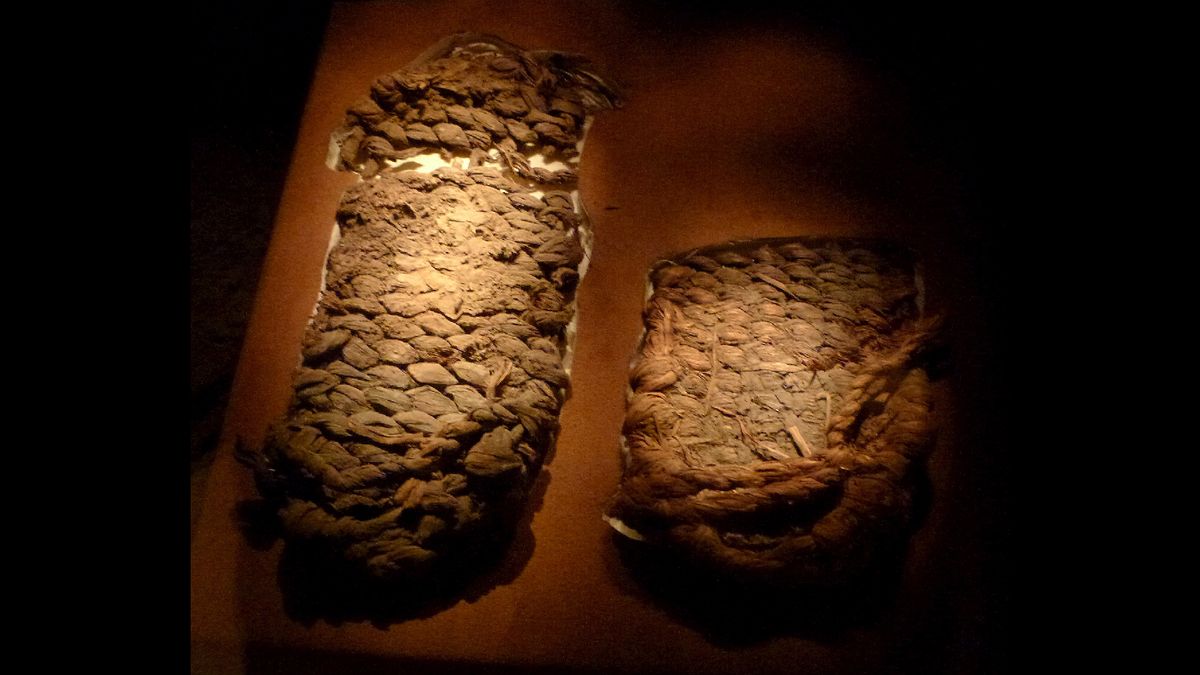Scientists have discovered many ancient shoes around the world, including 5,500-year-old leather shoes in Armenia, 6,200-year-old grass sandals in Spain, and footwear as old as 8,300 years old in Missouri.
But when did humans actually invent shoes? That’s tricky to answer because the animal skins, plant fibers and other materials used to make shoes tend to break down over time. The oldest known shoes are more than 10,000 years old, but our ancestors may have worn them much earlier than that, fossilized footprints suggest.
The oldest shoes that researchers have directly dated are a pair of 10,400-year-old sandals recovered from Fort Rock Cave in central Oregon, according to Thomas Connolly, archaeological research director at the University of Oregon’s Museum of Natural and Cultural History.
Archaeologists who began excavating at Fort Rock Cave in 1938 discovered dozens of sandals woven from sagebrush bark and other fibers. Similar footwear has been found at nearly a dozen sites in the northern and western Great Basin, the arid U.S. region between the Sierra Nevada and the Rocky Mountains, Connolly explained. “Generally, these are finely made, with a flat sole and foot cover,” he told Live Science.
Related: 12 old shoes found in archaeological excavations from around the world
Scientists who interviewed Native groups in the Oregon area, such as the Klamath and Northern Paiute peoples, found that “in historic times, woven footwear was for winter use, especially for work around cold marshes and lakes where one might retrieve fishing or fowling nets, or harvest bulrushes for mats and baskets,” Connolly said.
Although these sandals are porous, their fibers would have retained body heat to keep feet warm, even when they were soaked in water. “Ethnographer Samuel Barrett was told by his Klamath informants that woven shoes were worn so that ‘one might in the dead of winter walk with comparative comfort through marshes where the water is extremely cold,'” Connolly said.
He noted that one set of human remains found in Nevada, known as the Spirit Cave Mummy, may have shoes that are older than the Fort Rock Cave sandals. The mummy, which is about 10,600 years old, has hide moccasins, Connolly said. However, scientists have not directly measured the age of the footwear.
150,000-year-old shoe prints?
While these examples are the oldest known footwear, there may be evidence that humans invented shoes much, much earlier. Fossil tracks on a beach in South Africa may be shoe prints dating back up to 150,000 years, according to a 2023 study.
When Charles Helm, a research associate at Nelson Mandela University in South Africa, and his colleagues analyzed the fossil tracks, they noticed a resemblance to human footprints except for the absence of toe impressions, which suggested that whoever created the prints may have been wearing shoes.
“There is something wonderfully evocative about thinking of our ancestors that long ago having the capacity to develop and wear shoes,” Helm told Live Science. “Then, as now, protection from injury and from temperature extremes were probably an incentive to create footwear.”
However, they found no direct fossil traces of any shoes. “It is probable that the organic substances from which ancient footwear was fashioned would long since have perished, and we therefore needed to look for other evidence,” Helm said.
In the 2023 study, the researchers looked to the sandals used by the modern Indigenous San people on the sands of the Kalahari Desert for ideas as to what ancient footwear might have looked like. They also examined 2,000-year-old San rock art that depicted a shaman wearing shoes.
Helm and his colleagues crafted a variety of shoes, which they wore to create trackways on the sands of South Africa’s south coast. They found that an open, hard-sole design with tracks made on moist, moderately soft sand best fit the fossil tracks.
“One hundred and fifty thousand years is pretty ancient, but I wouldn’t dismiss it out of hand,” Connolly said.


